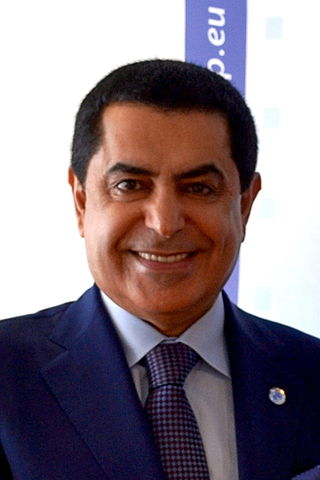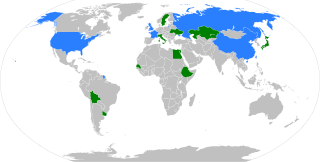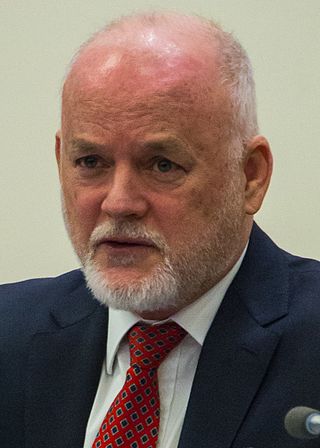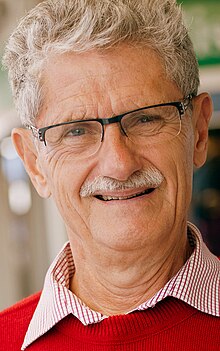
The United Nations General Assembly is one of the six principal organs of the United Nations (UN), serving as its main deliberative, policymaking, and representative organ. Currently in its 78th session, its powers, composition, functions, and procedures are set out in Chapter IV of the United Nations Charter.

The Inter-Parliamentary Union is an international organization of national parliaments. Its primary purpose is to promote democratic governance, accountability, and cooperation among its members; other initiatives include advancing gender parity among legislatures, empowering youth participation in politics, and sustainable development.

Mogens Lykketoft is a Danish politician who served as Leader of the Social Democrats (Socialdemokraterne) from 2002 to 2005.

The Sixty-sixth Session of the United Nations General Assembly opened on 13 September 2011 at 15:00 and was presided over by former Qatari permanent representative to the UN Nassir Abdulaziz Al-Nasser. The session ended on 18 September as al-Nasser symbolically passed the gavel to the president of the next session, Vuk Jeremic.

The 2015 United Nations Security Council election was held on 15 October 2015 during the 70th session of the United Nations General Assembly, held at United Nations Headquarters in New York City. The elections are for five non-permanent seats on the UN Security Council for two-year mandates commencing on 1 January 2016. In accordance with the Security Council's rotation rules, whereby the ten non-permanent UNSC seats rotate among the various regional blocs into which UN member states traditionally divide themselves for voting and representation purposes, the five available seats are allocated as follows:

The Sixty-seventh session of the United Nations General Assembly opened on 18 September 2012 and having its last scheduled meeting on 11 September 2013. The President of the United Nations General Assembly was chosen from the EEG with Serbia's then foreign minister Vuk Jeremić beating out Lithuania's Dalius Čekuolis in an election. Notably, the session led to United Nations General Assembly resolution 67/19 which granted Palestine non-member observer state status.

The Sixty-eighth Session of the United Nations General Assembly opened on 17 September 2013. The President of the United Nations General Assembly was chosen from the GRULAC with Antigua and Barbuda's John William Ashe being the consensus candidate, thus bypassing the need for an election.

The 2016 United Nations Security Council election was held on 28 June during the 70th session of the United Nations General Assembly, held at United Nations Headquarters in New York City. The elections were for five non-permanent seats on the UN Security Council for two-year mandates commencing on 1 January 2017. In accordance with the Security Council's rotation rules, whereby the ten non-permanent UNSC seats rotate among the various regional blocs into which UN member states traditionally divide themselves for voting and representation purposes, the five available seats were allocated as follows:

The Sixty-Ninth session of the United Nations General Assembly opened on 16 September 2014. The President of the United Nations General Assembly was chosen from the African Group with Uganda's Sam Kutesa being the unanimous African Union's Executive Council's candidate, thus bypassing the need for an election.

The General debate of the seventieth session of the United Nations General Assembly commenced on 28 September and ended on 3 October 2015. Leaders from a number of member states addressed the UNGA.
The 70th anniversary ("UN70") of the founding of the United Nations (UN) fell in 2015. Around the time of the launch on 1 October by UN Secretary-General Ban Ki-moon, celebratory events took place in various locations. Several international conferences were held, including one to approve a new set of Sustainable Development Goals. A "treaty event" was held to encourage more nations to join multilateral treaties, and steps were taken towards agreement on reform of the Security Council.

The Seventy-first Session of the United Nations General Assembly opened on 13 September 2016. The President of the United Nations General Assembly is from the Asia-Pacific Group.
An indirect presidential election was held to choose the President of the United Nations General Assembly on 13 June 2016 to replace Mogens Lykketoft and preside over the Seventy-first session of the United Nations General Assembly. It was the rotational turn of the Asia-Pacific Group to preside over the session. Peter Thomson was elected with 94 votes for and 90 votes against. This was the first time since 2012 that there was no consensus candidate from the regional groupings, thus invoking a secret ballot vote. His tenure begins on 13 September 2016.

The Seventy-second Session of the United Nations General Assembly opened on 12 September 2017. The President of the United Nations General Assembly was from the Eastern European Group.

The Seventy-third session of the United Nations General Assembly was opened on 18 September 2018. The President of the United Nations General Assembly was from the GRULAC group.

The General debate of the seventy-third session of the United Nations General Assembly (UNGA) was opened on 25 September and ran until 1 October 2018. Leaders from a number of member states addressed the UNGA.

The Seventy-fourth session of the United Nations General Assembly was the session of the United Nations General Assembly which was opened on 17 of September 2019 until 16 September 2020.

The Seventy-fifth session of the United Nations General Assembly was the session of the United Nations General Assembly which ran from 16 September 2020 to 15 September 2021. The President for the session was Volkan Bozkır, who stated that the session's theme was "The future we want, the United Nations we need; reaffirming our collective commitment to multilateralism".

The Seventy-sixth session of the United Nations General Assembly was the session of the United Nations General Assembly which ran from 14 September 2021 to 13 September 2022. The President of the UN General Assembly is from Asia-Pacific Group.

The Seventy-seventh session of the United Nations General Assembly was the session of the United Nations General Assembly which opened on 13 September 2022, and closed on 5 September 2023. The President of the UN General Assembly was from Eastern European Group.

















